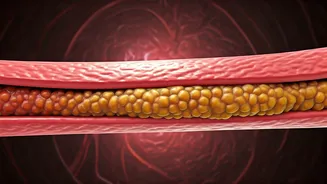Plaque Formation Explained
Arterial plaques, a significant concern for heart health, develop through a complex process within the blood vessels. These plaques, primarily composed
of cholesterol, fats, and cellular waste products, gradually accumulate within the artery walls. This buildup stiffens the arteries, diminishing their elasticity and restricting blood flow. Initially, the process may be asymptomatic, but the consequences of plaque formation can manifest in severe cardiovascular conditions. The initiation of plaque development is often triggered by inflammation, oxidative stress, and damage to the artery's inner lining. Risk factors like high LDL cholesterol levels, high blood pressure, and smoking contribute to the acceleration of this detrimental process. Understanding the mechanics of plaque formation is crucial in addressing and mitigating its negative effects on the cardiovascular system. As plaque accumulates, it narrows the arteries, decreasing blood flow and thus increasing the likelihood of heart attacks or strokes.
Dietary Strategies for Arteries
Diet plays a pivotal role in managing and reversing arterial plaque. A heart-healthy diet forms the cornerstone of effective strategies. Diets rich in fruits, vegetables, and whole grains provide essential nutrients and antioxidants, which combat oxidative stress and inflammation, key factors in plaque development. Focus on incorporating fatty fish, like salmon and tuna, to get omega-3 fatty acids, which can lower triglyceride levels and reduce the risk of heart disease. Limit your intake of saturated and trans fats, found in processed foods and red meat, as these contribute to the accumulation of plaque. Opt for healthy fats from sources like olive oil and avocados. Additionally, reducing sugar and refined carbohydrates intake can help maintain healthy cholesterol levels. By prioritizing a balanced and nutrient-rich diet, individuals can significantly contribute to arterial health, minimizing plaque buildup and supporting overall cardiovascular wellness. It's recommended to consult a healthcare professional or a registered dietician for personalized dietary advice.
Importance of Exercise
Regular physical activity is another critical element in the fight against arterial plaques. Consistent exercise helps improve cardiovascular function and promotes overall well-being. Engage in moderate-intensity activities, such as brisk walking, jogging, or cycling, for at least 150 minutes per week. These activities help lower LDL cholesterol levels (the 'bad' cholesterol), raise HDL cholesterol (the 'good' cholesterol), and reduce blood pressure. Exercise also aids in weight management, reducing the strain on the cardiovascular system and thus mitigating the progression of plaque buildup. Incorporating both aerobic and strength-training exercises can provide comprehensive benefits. Aerobic exercise enhances heart and lung function, whereas strength training helps improve muscle mass and metabolic health. Start gradually and gradually increase the intensity and duration of your workouts as your fitness improves. Consulting a healthcare provider before starting any new exercise program, particularly if you have pre-existing health conditions, is always recommended.
Managing Stress Effectively
Stress management is critical, as chronic stress contributes to the progression of arterial plaque. High stress levels trigger the release of hormones that can elevate blood pressure and increase inflammation, both of which accelerate plaque formation. It is important to find healthy ways to manage stress, such as yoga, meditation, and deep-breathing exercises. Engage in activities you enjoy, like spending time in nature, listening to music, or pursuing hobbies, to relax. Regular physical activity can also effectively reduce stress levels. Getting adequate sleep is essential, as sleep deprivation can worsen stress. Creating a supportive social network by connecting with friends and family can help combat stress. If stress is overwhelming, consult a mental health professional for guidance. By adopting and incorporating stress-reducing techniques into your daily life, you can effectively help safeguard your heart and overall health.
Monitoring Blood Pressure
Maintaining healthy blood pressure is vital in preventing and reversing arterial plaque. High blood pressure places undue stress on artery walls, promoting inflammation and accelerating plaque formation. Regularly monitor your blood pressure through home monitoring devices or during doctor visits. If your blood pressure is high, work with your healthcare provider to manage it. This may involve lifestyle changes such as diet, exercise, and stress management, as well as prescribed medications. Dietary sodium reduction, consuming a balanced diet rich in potassium, and limiting alcohol consumption are useful in controlling blood pressure. Adhering to medical advice and regularly monitoring blood pressure ensures effective management and reduces the risk of cardiovascular complications. Maintaining a healthy blood pressure significantly reduces the strain on your arteries, thus supporting their health and function.
The Role of Medications
Sometimes, lifestyle changes alone may not be sufficient to reverse or prevent the advancement of arterial plaque. In such cases, your healthcare provider may prescribe medications to manage conditions like high cholesterol, high blood pressure, and diabetes, all of which contribute to plaque development. Statins are commonly prescribed to lower LDL cholesterol levels. ACE inhibitors and beta-blockers help manage high blood pressure. Antiplatelet medications, like aspirin, can reduce the risk of blood clots. Always take medications as directed by your doctor. It's crucial to understand both the benefits and potential side effects of each medication. Regular follow-up appointments with your healthcare provider are crucial to monitor the efficacy of your medications and to make any necessary adjustments. By combining medications with lifestyle adjustments, individuals can effectively manage their cardiovascular health and slow the progression of arterial plaque. Never change or discontinue any medication without consulting your doctor.


















